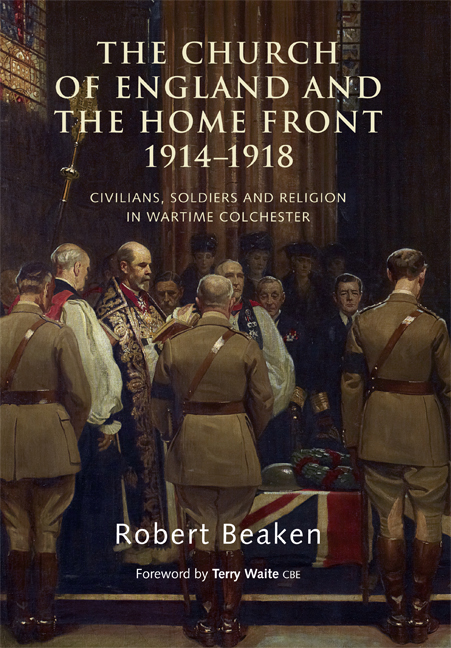 The Church of England and the Home Front, 1914-1918
The Church of England and the Home Front, 1914-1918 Book contents
- Frontmatter
- Dedication
- Contents
- List of Illustrations
- Foreword
- Author’s Acknowledgements
- 1 The First World War – One Hundred Years On
- 2 Colchester
- 3 Wartime
- 4 The Clergy
- 5 The Laity
- 6 Prayer and Worship
- 7 The National Mission of Repentance and Hope
- 8 Thought and Attitudes
- 9 Armistice, Remembrance and Aftermath
- 10 The Church of England and the First World War
- Bibliography
- Index
5 - The Laity
Published online by Cambridge University Press: 11 May 2021
- Frontmatter
- Dedication
- Contents
- List of Illustrations
- Foreword
- Author’s Acknowledgements
- 1 The First World War – One Hundred Years On
- 2 Colchester
- 3 Wartime
- 4 The Clergy
- 5 The Laity
- 6 Prayer and Worship
- 7 The National Mission of Repentance and Hope
- 8 Thought and Attitudes
- 9 Armistice, Remembrance and Aftermath
- 10 The Church of England and the First World War
- Bibliography
- Index
Summary
Archbishop Cosmo Gordon Lang once expressed the view that the years 1890–1914 were the ‘Golden Age of parochial work in the towns of England’. To ascribe golden qualities to any age is to court controversy, but the picture that emerges of parish life in Colchester in the years immediately before and during the First World War is one of great busyness, involving many people.
It was occasionally alleged later in the twentieth century – sometimes as a result of friction between different Anglican churchmanships – that parish life in the recent past had been over-clericalised, and characterised by a dominant clergy and a passive laity whose members were under-used, seldom consulted, and of whom the clergy had limited expectations.
Like all generalisations, this claim contains an element of truth: the clergy a century ago were accorded a greater deference in a more classconscious society, where – by status, and not infrequently by birth – they formed a part of the social elite. In many parishes in 1914–18, the clergy were better educated than the bulk of their parishioners. It is also true that the lives and contribution of the clergy are better documented than those of the laity. Worship a century ago was almost entirely the preserve of the clergy, particularly in those parishes where the principal service was Mattins, at which the vicar officiated, read the lessons from the Old Testament and New Testament, said the prayers and preached the sermon. Lay participation was usually limited to handing out the books, singing in the choir and taking the collection; though in a few churches a prominent layman might occasionally be invited by the vicar to read a lesson. Ironically, in Anglo-Catholic parishes – where there was usually a much higher doctrine of the priesthood – laypeople tended to be more involved in worship. This was because the principal service was a Sung Eucharist instead of Mattins, and laymen usually acted as altar servers, acolytes, thurifers, and so on.
However, this generalisation about the role of the Anglican laity ought to be treated with a degree of caution. The evidence from Colchester indicates that laymen and laywomen played a very important part in the daily life of all parishes before and during the First World War; it provides grounds for questioning, as over-simplistic, the picture of an over-clericalised Church and an under-valued or under-used laity.
- Type
- Chapter
- Information
- The Church of England and the Home Front, 1914-1918Civilians, Soldiers and Religion in Wartime Colchester, pp. 86 - 122Publisher: Boydell & BrewerPrint publication year: 2015


